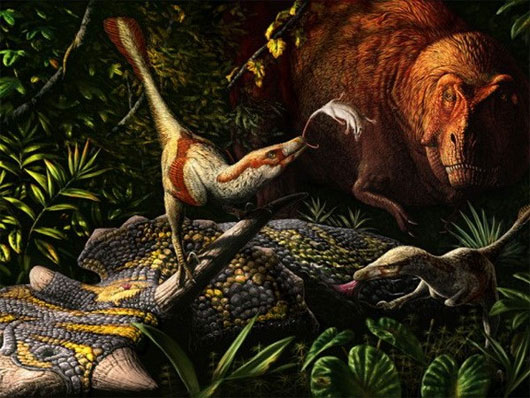Discover new carnivorous dinosaur fossils in Canada
Canadian scientists have discovered a new carnivorous dinosaur fossil in Canada.
>>>Discovering "armored" dinosaurs never known
This species of dinosaur named Acheroraptor Temertyorum , has lived on Earth about 66 million years ago and is a close relative to the Velociraptor dinosaur.
The team, led by David Evans, who is in charge of vertebrate ancient organism samples at the Ontario Royal Museum, discovered the dinosaur fossil on Hell Creek in Montana.
This discovery provides a more complete picture of ecosystems in North America, helping scientists better understand what happened before the major extinction period marked the end of the dinosaur era.

The Acheroraptor Temertyorum dinosaur has lived on Earth about 66 million years ago.(Source: redorbit.com)
Archeroraptor is one of the last bird dinosaurs, living with the Tyrannosaurus Rex and Triceratops dinosaurs.
Archeroraptor dinosaurs walk on large legs, have long skulls and dagger-like teeth. This is one of the last carnivorous dinosaurs that lived in the northwestern United States 66-67 million years ago.
Earlier this month, Canadian researchers also discovered an intact fossil skeleton at Alberta's Dinosaur Park.
This is the fossil of a small dinosaur of the species Chasmosaurus Belli, who lived 70 million years ago.
Research shows that there are no traces of injury on dinosaur fossils, so scientists predict that the animal may have fallen into a river near Alberta, drowned and buried in sediment. .
Based on the fossil skeleton size, the team concluded that the dinosaur died at 3 years old with a body length of about 1.5m.
This is considered the intact dinosaur fossil of the smallest size ever discovered among horny plant dinosaur fossils and is a very rare case.
This fossil study will help paleontologists learn about the evolution of plant-eating dinosaurs, as well as determine the age of small dinosaur bones discovered over the years.
- Discover the oldest carnivorous dinosaur
- Discover new carnivorous dinosaurs
- Repeatedly discovered dinosaur fossils in Canada
- The dinosaur fossil is about the size of a chicken
- Fossilized a new carnivorous dinosaur up to 6m tall
- 110 million year old dinosaur fossils
- Europe's largest carnivorous dinosaur
- Found a fossil dinosaur fossil
- Revealing the oldest carnivorous dinosaur ever existed, 7.5 meters long and weighs 1 ton
- New fossil carnivorous dinosaurs discovered in South America
- Park of dinosaur fossils - Canada
- Identify giant carnivorous dinosaurs
 Discovered an ancient centipede fossil 99 million years old
Discovered an ancient centipede fossil 99 million years old Discovered bat-like dinosaurs in China
Discovered bat-like dinosaurs in China Discovered a 200-year-old bronze cannon of the coast
Discovered a 200-year-old bronze cannon of the coast Discover 305 million-year-old spider fossils
Discover 305 million-year-old spider fossils